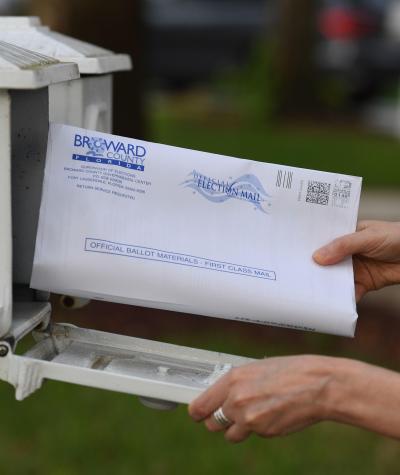After a record 4.9 million Floridians voted by mail in 2020, some Florida legislators are moving to restrict access to that option. Their proposals, backed by Gov. Ron DeSantis, seek to limit vote-by-mail on a number of fronts, including by purging vote-by-mail registration rolls before the 2022 elections, limiting who can drop off mail-in ballots, and potentially eliminating all ballot dropboxes.
The primary bill introduced thus far, Senate Bill 90, would erase all names on the current vote-by-mail registration list and force voters to reapply every election cycle. Under current Florida election law, requests for vote-by-mail ballots last for two general election cycles, unless the voter opts out.
Changing the law to require voters to reapply every election cycle instead would make it significantly more difficult for Floridians to vote by mail.
Moreover, the bill includes no provisions detailing how—or if—the state will notify voters who are currently on the vote-by-mail registration list that they will need to reapply in order to vote by mail in the 2022 elections.
This is nothing short of bait and switch for voters who were told their vote-by-mail application would cover this election cycle and may now find themselves waiting for a mail-in ballot that will never arrive.
Local election officials across Florida have already expressed strong opposition to the bill, given the heavy burden it will place on voters and local election departments.
As one county supervisor of elections noted “In Miami-Dade County alone, [the bill would impact] more than 404,000 voters who would be wiped from the list [to vote by mail for 2022] . . . even though these voters have already requested and are expecting to receive ballots for these elections.”
Beyond Senate Bill 90, DeSantis has also proposed measures to limit the availability of ballot dropboxes and prohibit anyone but voters or their immediate family from dropping off mail-in ballots. These changes would disproportionately impact voters of color, low-income communities, individuals with disabilities, and anyone else who is unable to travel to deliver their own ballot.
If Florida eliminates ballot dropboxes altogether, as DeSantis has suggested, it would also make Florida the largest state that permits no-excuse absentee voting but does not allow voters to return their ballots using a dropbox. Dropboxes are a commonsense solution for voters seeking to return their ballots securely without betting their vote on the timeliness of mail service.
With the introduction of these proposals, Florida has emerged as another state to watch for new anti-voter laws this year. Around the country, 43 states have introduced a staggering 250 bills that restrict voting access, and battleground states like Arizona, Georgia, and Pennsylvania have seen a particularly high volume of new anti-voter laws.
In Florida, though, the story is different. Unlike lawmakers in other states, the proponents of these changes in Florida do not claim that there were issues with mail-in ballots during the 2020 election. To the contrary, DeSantis has touted the Florida 2020 election as the “smoothest, most successful election of any state in the country.”
Instead, this push to limit vote-by-mail comes after the first election in years where Democrats in Florida outvoted Republicans by mail. Prior to 2020, Republicans had actually dominated vote-by-mail in the state for a number of years, and many of the proponents of these new rollback bills supported expanding vote-by-mail not long ago.
In context, these proposals appear to be entirely about partisan politics not voter access or election integrity. Voters in Florida deserve to know the real motivations driving these new changes. And Florida legislators should be held accountable for this attempt to manipulate election laws for partisan gain.
